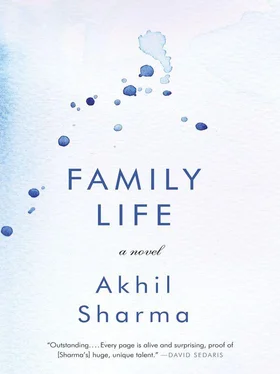By the time our airplane tickets arrived, not every family hired a band to play outside their house on the day of the departure to a foreign country. Still, many families did.
IT WAS AFTERNOON when the tickets came. My brother and I were in the living room playing Snakes and Ladders. The light was dim from the curtains that had been drawn to keep out the heat. When we heard shouts from the street, we knew it had to be the tickets.
Birju and I climbed out onto the balcony that connected our apartment’s two rooms. Below us the street shimmered with August heat. I was eight at the time and Birju twelve. Five or six children my own age or even younger were walking in our direction. Leading them was a skinny sunburnt young man and a fat gray-haired woman in pantaloons and a baggy shirt. Children kept breaking away from the group. Every house on our street had boundary walls, topped with shards of glass. These walls were broken with iron gates, and the children stopped before the gates and shouted, “Shuba auntie’s tickets have come.” I had never heard us shouted about before. I became excited. I smiled. I wanted to shout and wave that we were home.
Behri auntie, the fat woman leading the crowd, was a neighbor. Almost anybody who was not a relative but toward whom we had to show respect was an “auntie” or “uncle.” I knew Behri auntie didn’t like us and was coming just to be present when the tickets arrived so later she could say she was there. The thin man was the messenger. He walked proudly, his head high, not acknowledging the children following him. He was holding a large manila envelope in one hand.
Birju and I on the balcony flattened ourselves into the little shade that lay along the wall. Birju looked down at the street and muttered, “Everybody becomes your friend when you’re going to America.” He had curly hair and a round fat chin that seemed to lengthen his face with its weight. Hearing him, my pride at being shouted about turned to embarrassment. Both my brother and my mother had a way of speaking that made them sound as if they knew secret things. People might be able to fool themselves and each other, but my brother and mother could look into them and see the truth. My brother had another thing that gave him an air of authority. He was ranked first in his class, and as happens in such cases, everybody in our neighborhood treated him as special. Because of his good grades, he appeared to be somebody who had a destiny. There was a sense with Birju that he was already connected to the wider world. When he passed judgment, it felt like when the radio made an announcement and one felt that whatever one had heard had to be correct.
“Your mouth drips poison,” I said.
A few minutes later, the crowd arrived in our living room. Behri auntie sat down panting on a stool.
“Well, Shuba,” she said, “at last you are getting your wish.”
My mother had been napping and her hair was loose. She was wearing a wrinkled cotton sari. Silently she examined the tickets, which looked like checkbooks. The messenger stood before her, and the children who had come with Behri were scattered around the dim space, writing their names on the luggage tags that the messenger had brought.
When my mother didn’t reply, Behri said, “Your mister must be very happy, too.” Even I knew that there was something improper about the word “mister.” In those shy days, when even husbands and wives never touched in public, to wander out of Hindi was to suggest that something indecent was being referred to.
“Mishraji will be happy to see Birju and Ajay,” my mother said, and her using my father’s last name with a “ji” attached signaled that we could not be accused of indecency.
“He will be happy to see you, too. He’s been away for a year.” After Behri said this, there was a lingering silence. I wasn’t sure of the meaning of all that was being exchanged, but I understood that some battle was occurring.
“Happy, Shuba?” Behri said, as if to confirm her victory.
“Why shouldn’t I be happy?” my mother asked sounding irritated.
Confronted, Behri looked away.
In the silence that followed, the messenger leaned toward my mother. He whispered, “Reward, reward.” He used the Urdu word “inam,” as if to turn the giving of a tip into something Mughal and aristocratic.
The idea of tipping for ordinary services had only recently entered India. Nobody wanted to tip, though, and so everyone looked for nonblameworthy ways to avoid doing so. Tipping was therefore often condemned as Muslim or a foreign affectation.
Behri heard the “inam” and, wanting to be angry at someone, whipped her head toward the messenger. “Inam? That’s not the sort of neighborhood you have come to, Brother. We are ordinary people. We don’t speak English. We don’t wear blue jeans. We don’t drink wine and have three wives.”
Birju, like me, enjoyed bullying people, especially when he could get away with it. Seeing that an adult was harassing the messenger and since a messenger is poor and not a regular visitor, he, too, joined in chiding the man. “Reward! Brother, have you caught a bandit? Have you caught a fugitive? Can I ask this? If you have, we’ll make sure the police give you a reward.”
My mother, after her fight, was not now going to agree with anything Behri said. Though she, too, hated tipping, she said, “Ajay, go get my purse.” I left and went to our bedroom. The armoire where my mother kept the purse was in there. I came back after a moment with the bag.
The messenger took the one rupee coin. He touched it to his forehead.
Once he was gone, Behri said, “Shuba, you are already American.”
Then she pushed herself off the stool. She turned to the children. “Come, come. Go home.”
AT FIRST having the tickets thrilled me.
The next morning, I went to the milk shop at the end of our street. The shop was a cement booth about as wide as a ticket counter. It was a hot, bright morning and I was sweating by the time I arrived. The air near the shop smelled of milk and spoilage and the incense that the milkman burned every morning as part of his prayers. There was a crush of boys on the sidewalk, spilling off it onto the road, holding up their milk pails, calling out, “Brother, Brother,” to get the milkman’s attention.
Some of the boys looked at me and glanced away, their heads turning like oscillating table fans. Others glared as if I had taken something from them. To me, both reactions showed jealousy, and they thrilled me.
I came up to a boy and pressed my hands together before me. “Namaste,” I said. The boy looked at me strangely. I knew it was odd to speak so formally to someone my own age, but I felt that being excessively proper would make me even more special; not only was I going to America, but I was polite and humble. “How is your family? Everybody happy? Healthy?” Speaking increased my excitement. I tried not to smile. I took out a luggage tag from the pocket of my short pants. The tag had an elastic loop coming out of a small hole. “Our tickets arrived. We got these also. Do you want to see?” I held out the tag.
The boy was boxed in. If he refused to look, he would be revealing his jealousy and so appear weak. He took the tag. After handling it for a moment, he gave it back in silence.
I spoke again. “I learned that everybody in America has their own speedboat.” Nobody had told me any such thing. As I said this, though, it felt true. “Brother, I can’t swim. I hope I don’t drown.” To be modest and to also be leaving for America made me feel like I was wonderful.
The crowd shuffled. The boy I was talking to moved away. I turned to another boy and pressed my hands together once more.
THE SUNDAY AFTER the tickets arrived, my mother took me and Birju to see my grandparents. She shook us awake while it was still dark. We went out onto the roof and bathed using a bucket and a mug. It was strange to bathe with the moon above us. And when the horizon began to brighten that first light felt rare and precious. And then, a little later, as the sky brightened, we walked down the street toward the bus stand. Birju walked beside my mother and I walked in the shadow of the boundary walls. In the shade, the dust was heavier and things smelled different, as if a fragment of the night lingered.
Читать дальше












